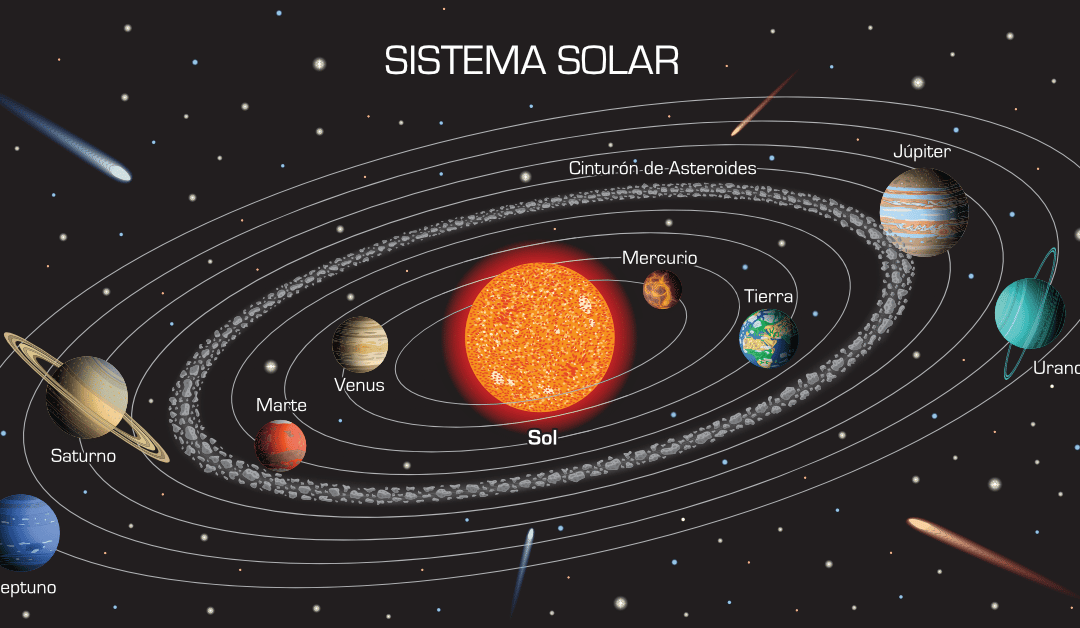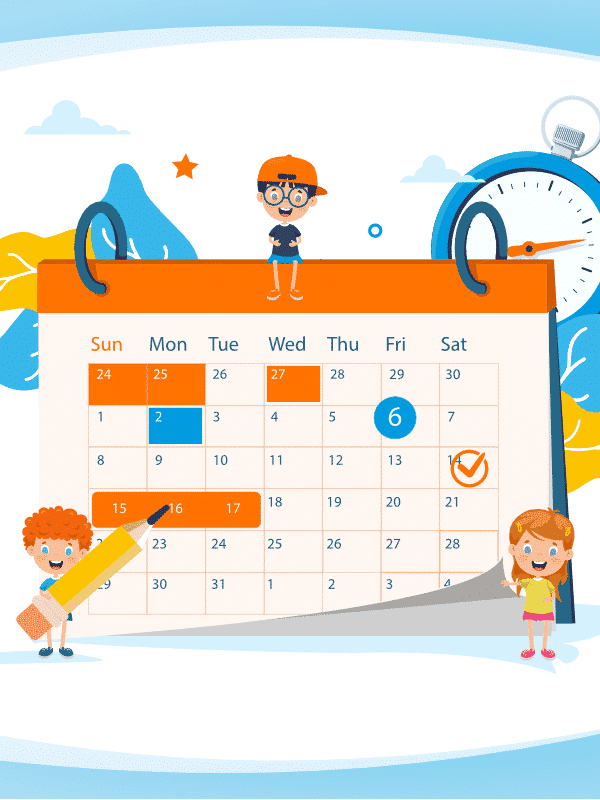The solar system is one of the very important things that kids learn in elementary school. It’s part of helping them understand the world that they live in. What is the sun? What are those things in the sky that shine every night? What planet do we live on? Kids are naturally curious, so this topic could be very interesting for them. Of course, that is depending on how it’s taught. But, overall, it could be a really fun learning journey for them.
And if you want your kids to be bilingual, then this is a topic that they should learn almost from the beginning. And, honestly, it can be very fun for children to learn about the Solar System in Spanish. There’s nothing better than acquiring a language through something that’s cool for them. They will be curious to learn more because they will be engaged in both the topic and the language.
The Planets in Spanish
Most of the planets are almost the same in both English and Spanish. So it won’t be very hard for kids to learn them and understand which one is one.
Non-Spanish speaking kids can do to learn the planets in Spanish by singing them. As we all know, songs and catchy melodies usually help us remember things, like the alphabet. Here is a Spanish song about the planets, so your kids can listen to it and repeat it. The video has some cute pictures that will help them see how each planet looks.
- Mecurio – Mercury
- Venus – Venus
- Tierra – Earth
- Marte – Mars
- Júpiter – Jupiter
- Saturno – Saturn
- Urano – Uranus
- Neptuno – Neptune
Remember back in the day when we were taught 9 planets were is our solar system instead of 8? That was until it was discovered that Pluto is a dwarf planet. But if you or your kids still wonder what Pluto’s name is in Spanish, it is Plutón. Once again, not very different from English.
The names of the other 4 dwarf planets are the same in English and Spanish: Ceres, Makemake, Haumea, and Eris.
Spanish Astronomy Vocabulary
- Solar System – Sistema Solar
- Space – Espacio
- Universe – Universo
- Astronomy – Astronomía
- Stars – Estrellas / Astros
- Sun – Sol
- Moon – Luna
- Planet – Planeta
- Planet Earth – Planeta Tierra
- Planet Red – Planeta rojo
- Dwarf planets – Planetas enanos
- Celestial bodies – Cuerpos celestes
- Cielo – Sky
- Galaxy – Galaxia
- Milky Way – Vía Láctea
- Comets – Cometas
- Asteroids – Asteroides
- Asteroid belt – Cinturón de asteroides
- Meteorite – Meteorito
- Rings – Anillos
- Ellipse – Elipse
- Space rocks – Rocas espaciales
- Constellations – Constelaciones
- Ice – Hielo
- Cosmic – Cósmico
- Cosmic dust – Polvo cósmico
- Orbit – Órbita
- Crater – Cráter
- Rocky – Rocoso
- Year – Año
- Earth days – Días terrestres
- Temperature – Temperatura
- Revolution – Traslación
(*In Spanish “revolution” can also be revolución, but that’s another meaning; it’s like war. The Solar System Spanish word for “revolution” is traslación.) - Rotation – Rotación
- Astronaut – Astronauta
- Rocket – Cohete
- Spacecraft – Nave espacial
- Alien – Alien / Extraterrestre
- Extraterrestrial life – Vida extraterrestre
- International Space Station – Estación Espacial Internacional
Spanish Phrases Describing the Sistema Solar
Nuestra galaxia es la Vía Láctea.
(Our galaxy is the Milky Way.)
Hay ocho planetas en el Sistema Solar.
(There are eight planets in the Solar System.)
Plutón ya no es un planeta, ahora es un planeta enano.
(Plutón is no longer a planet; now it’s a dwarf planet.)
El Sol es la única estrella en nuestro Sistema Solar.
(The Sun is the only star in our Solar System.)
Los planetas más cercanos al Sol son Mercurio, Venus y Tierra.
(The closest planets to the sun are Mercury, Venus, and Earth.)
Los planetas más lejanos al Sol son Saturno, Urano y Neptuno.
(The farthest planets to the Sun are Saturn, Uranus, and Neptune.)
El planeta más pequeño del Sistema Solar es Mercurio.
(The smallest planet in the Solar System is Mercury.)
El planeta más grande del Sistema Solar es Júpiter.
(The biggest planet in the Solar System is Jupiter.)
Marte también es llamado “el planeta rojo debido a su color”.
(Mars is also called “the red planet” because of its color.)
Traslación es cuando los planetas giran alrededor del Sol.
(Revolution is when the planets revolve around the Sun.)
Rotación es cuando los planetas giran sobre su propio eje.
(Rotation is when the planets rotate on their own axis.)
Hay cuatro planetas que tienen anillos: Júpiter, Saturno, Urano y Neptuno.
(There are four planets that have rings: Jupiter, Saturn, Uranus, and Neptune.)
Ways to Help Kids Learn the Solar System in Spanish
Learning or reading out loud the words and sentences above is a great learning exercise. But there are also other ways in which you can help your kids understand the Solar System while learning Spanish.
YouTube Videos
YouTube is a huge platform with videos from different countries and various topics. You can find so many different videos explaining the Solar System in Spanish. You can even watch these videos with your children. That way if they have questions, you can answer them or help them look up on Google for the right answers. With videos, they’ll also learn the correct pronunciation of Spanish words.
Here is one animated video explaining the Solar System and the most important things about each planet. It’s like watching a cartoon because it follows a kid with the mission of exploring space.
And here’s another animated video explaining the rotation and revolution of planet Earth. Once again, it is very interesting because it is like a cartoon; not a boring explanation.
Movies
If your kids love movies, then you can watch films about space or planets dubbed in Spanish or with Spanish subtitles. Movies like “Interstellar” or “The Martian”, though very popular, might be boring or too complicated for a little kid. But there are other children’s films about space. You all can watch “Zathura: A Space Adventure” or “Space Buddies”.
Space and science fiction movies won’t get into every detail about the Solar System because they’re following the characters’ storyes. Nonetheless, they can make your children excited about this topic. After watching the movie, they might want to learn more about planets, stars, and everything within the Solar System.
Plus, if you watch the movies in Spanish, kids will easily acquire Solar System words. Because they won’t feel forced to memorize them.
Songs
As we have mentioned before, songs are a great tool to help kids – and anyone, for that matter – remember things. People learned the alphabet by singing it. So why not do the same with the Solar System and the Spanish language?
To learn both things, you just have to play Spanish songs about the Solar System. Catchy rhythms will make your kids start singing the lyrics and memorize them. Therefore, they will also memorize important words in Spanish about planets, stars, moons, and everything in space.
But memorizing it’s not the only goal. The main focus is on kids understanding the Solar System in Spanish. And songs in Spanish about this topic will definitely do that.
There are many songs about the planets in Spanish. There are also songs about the moon, Pluto, Venus, the sun, and more.
Drawing
Drawing is a great activity to keep our kids calm and boost their creativity. It’s also great to help them truly recognize and learn something. For example: if they’re learning about the Solar System in school, to strengthen their knowledge you can have them draw the planets and the sun.
To add the bilingual factor, have them write the Spanish names for each drawing below or next to them. This way, they will recognize how el sol (the sun) or la Tierra (the Earth) looks. And it’ll be easier for them to learn.
Arts and Crafts
Remember how in most schools the teachers would have us do scale models of different things? This included the Solar System. And though some kids might’ve liked this homework, some others didn’t. It’s all about what your children have fun with. If they are creative kids and love building stuff, they might enjoy some arts and crafts.
You can help them build the scale model. That way you can teach them the Spanish names of everything while you glue the things together, and paint them.
With this project, you’ll reaffirm what they’ve been learning in school, and introduce them to the Spanish language.
But if this seems too much like a school assignment for them, make something more fun. Craft a game that every kid loves: a memory game! And you can use the Spanish Solar System words we taught you above to write on each card. After crafting the game, you all can play together.
Play Astronauts
Another great way to boost your kid’s creativity is to play and let them invent the story along the way. The theme can be astronauts and space. You can be on a mission and explore each planet, and learn about the sun and the moon.
The challenge of the game could be to speak in Spanish. If your kids are not very fluent, they can just say some words, like the name of the planets, in Spanish. Encourage them to speak the language while having fun. It’s the best way they’ll learn it.
Learn More Spanish with TruFluency Kids
We are here to support your kids if you want them to keep learning the language after they’ve mastered the Solar System in Spanish. Or even if they’re complete beginners. We can teach them useful everyday Spanish vocabulary, idioms, and expressions. We can also help them learn some Spanish words for an interesting topic they might be seeing at school.
Most of all, we’ll have them speak Spanish, because our main goal is language fluency. After all, they’re learning Spanish to be able to speak it. And that will bring many benefits for them, like understanding Spanish books and songs, making international friends, or getting a job abroad.
We’ve been telling you that activities are a great way for kids to acquire the language. We truly believe that. That’s why in each TruFluency Kids Spanish class, children will do something fun, like singing, playing games, making crafts, or cooking.
Since we know that parents are very busy and every family has a different routine, we have flexible schedules. All of our classes are completely online, and we have lessons from 9 am to 9 pm (CST). So it doesn’t matter where you are, your kids can study with us. And if they miss a class, they can jump into another one.
Read our testimonials to see why parents think we’re the best option for joyful Spanish classes, find more info about how it works, and get started by registering for our next class session!


